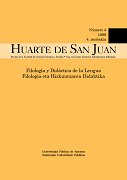"Los ángeles mudos": la renovación poética al servicio de la temática albertiana
Keywords:
Rafael AlbertiAbstract
The reading of "Los ángeles mudos", one of the less studied poems in Alberti’s “Sobre los ángeles”, can provide us with clues that account for the poet's use of a language radically different from his previous works. More than reflecting an aesthetic crisis, this language has a double function: expressing and uniting the poem's two central themes, namely, the impossibility of communication and the consequent division of the lyrical self.
Downloads
References
CULLER, Jonathan. "Apostrophe." Diacritics 7, No. 4, (1977): 63-68.
GAGEN, Derek. "The Consequences of Concupiscence: Love Poetry in Sobre los ángeles." Romance Studies 32 (Autumn 1 998): 5- 1 9.
GEIST, Anthony L. "Hell's Angels: A Reading of Alberti's Sobre los ángeles." Hispanic Review 54.2 (Spring 1 986): 163-182.
LACALLE CIORDIA, María Angeles. "Alberti y el paraíso recobrado." Notas y estudios filológicos 13 (1998): 83-143.
MORRIS, Cyril Brian. Rafael Alberti's "Sobre los ángeles ": Four Major Themes. Hull: University of Hull, 1 966.
NANTELL, Judith. Rafael Alberti's poetry of the thirties: the poet's public voice. Athens and London: University of Georgia, 1986.
RUGG, Marilyn D. "Sobre los ángeles: The Poetic Voices of Rafael Alberti." MLN 98 (1983): 259-267.
SENABRE, Ricardo. La poesía de Rafael Alberti. Cursos Internacionales. Salamanca: Universidad de Salamanca, 1977.
SALINAS DE MARICHAL, Solita. El mundo poético de Rafael Alberti, Madrid: Gredas, 1968.
WALLACE, Jeanne C. The Figure of the Angel in Contemporary Spanish Poetry (with a Background Study), Mexico City, Mundo Marino, 1990.
ZULUETA, Emilia de. Cinco poetas españoles. Madrid: Gredos, 1971.
Downloads
Published
How to Cite
Issue
Section
License
All articles are published under a Creative Commons (BY-NC-ND 4.0) license. Each article will be assigned a DOI.
Authors retain copyright of their work and grant the journal the right to the first publication. Authors can sign additional agreements to non-exclusive distribution of the published version of the article (for example, in an institutional repository) as long as appropriate attribution to the original publication is provided. Articles can be uploaded to institutional repositories immediately after publication.
Electronic distribution of the articles (for example, academic social networks or personal webpages) is allowed and encouraged.
The journal reserves the right to publicise the work in social networks and other electronic means.







